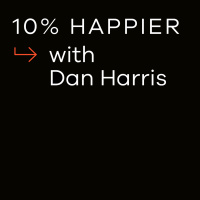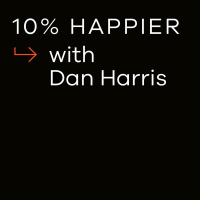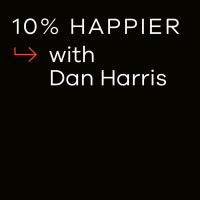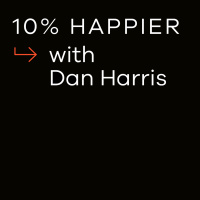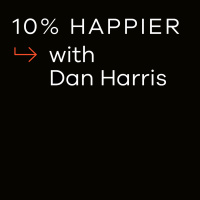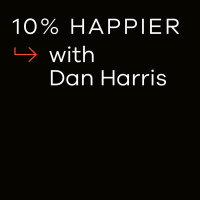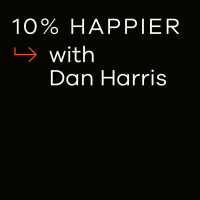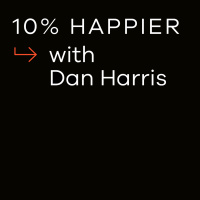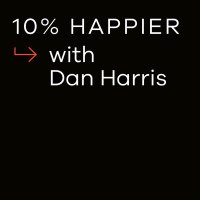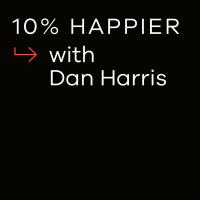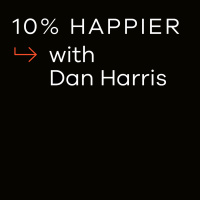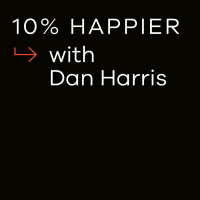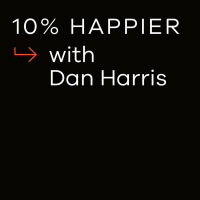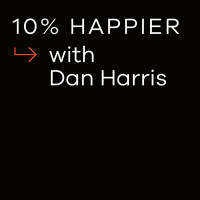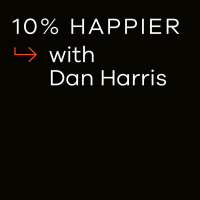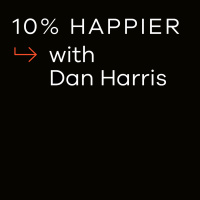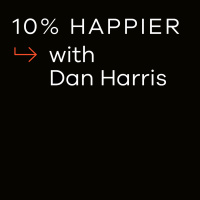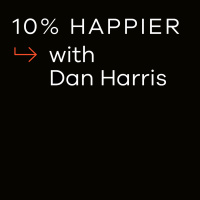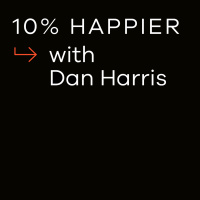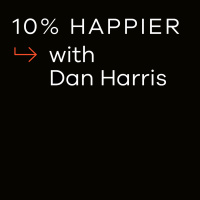Sinopsis
Dan Harris is a fidgety, skeptical ABC newsman who had a panic attack live on Good Morning America, which led him to something he always thought was ridiculous: meditation. He wrote the bestselling book, "10% Happier," started an app -- "10% Happier: Meditation for Fidgety Skeptics" -- and now, in this podcast, Dan talks with smart people about whether there's anything beyond 10%. Basically, here's what this podcast is obsessed with: Can you be an ambitious person and still strive for enlightenment (whatever that means)? New episodes every Wednesday morning.
Episodios
-
The Science of Making and Keeping Friends | Robin Dunbar
24/10/2022 Duración: 55minNew episodes come out every Monday, Wednesday, and Friday for free, with 1-week early access for Wondery+ subscribers. --- Friendship might not necessarily be something you’ve considered to be an urgent psychological and physiological issue. One thing we explore a lot on the show is that the quality of your relationships determines the quality of your life, and sadly, in many ways, it’s harder than ever to make and keep friends. With loneliness and disconnection on the rise, our society just wasn’t constructed for social connection, and recent data suggests we’re in a friendship crisis, with many of us reporting that we have fewer close friendships than ever. Our guest today is Robin Dunbar, an Emeritus Professor of Evolutionary Psychology at Oxford University and the author of numerous books on the development of homo sapiens. Dunbar is perhaps best known for formulating “Dunbar's number,” which is a measurement of the number of relationships our brain is capable of maintaining at any one time. He is a worl
-
Six Buddhist Strategies for Getting Along Better with Everyone | Sister True Dedication
19/10/2022 Duración: 01h06minNew episodes come out every Monday, Wednesday, and Friday for free, with 1-week early access for Wondery+ subscribers. --- Relationships can be tricky. Especially if you find yourself upset with someone, and instead of talking it through, you let it fester until one moment you completely lose it and end up having to apologize. If you’ve ever felt like you had friction with the people in your life, or that you’ve been taken for granted, today’s episode offers you solid strategies to cope. Sister True Dedication is a Zen Buddhist nun and teacher ordained by the great meditation teacher and author, Thich Nhat Hanh. She edited several of Thich Nhat Hanh’s books, including The Art of Living and Zen and the Art of Saving the Planet. She was born in the United Kingdom, studied history and political thought at Cambridge University, and worked for BBC News before ordaining as a nun at the age of 27. In this episode we talk about: The six phrases – or mantras – that Thich Nhat Hanh recommended people use in their
-
If You’ve Ever Doubted Whether Meditation Works, Listen to This Story | Ali Smith, Atman Smith, and Andres Gonzalez
17/10/2022 Duración: 01h06minNew episodes come out every Monday, Wednesday, and Friday for free, with 1-week early access for Wondery+ subscribers. --- You may remember hearing a massively viral story from a few years ago about a school in Baltimore that gave students meditation, instead of detention. Ali Smith, Atman Smith, and Andres Gonzalez founded the Holistic Life Foundation and are the authors of Let Your Light Shine, which recounts the story of their work helping traumatized children in one of America’s most underserved cities, and how mindfulness tools can help children and communities not only survive, but thrive. In this episode we talk about: The story behind their meditation-instead-of-detention initiative Their experience asking principals to give them the most challenging students What it’s like working in one of the most violent cities in the world The results from teaching students yoga and meditation How we can apply the lessons they’ve learned to meditation and life Content Warning: Explicit language. For a cle
-
George Saunders on: “Holy Befuddlement” and How to Be Less of a “Turd”
12/10/2022 Duración: 01h03minNew episodes come out every Monday, Wednesday, and Friday for free, with 1-week early access for Wondery+ subscribers. --- One of the great perils and problems of our age is that we sometimes become too entrenched in our views and attached to being right. According to guest George Saunders, the antidote is something he calls “holy befuddlement.” George Saunders is the author of eleven books, including Lincoln in the Bardo, which won the 2017 Man Booker Prize for best work of fiction in English. His most recent book, Liberation Day, is a collection of short stories that explore the ideas of power, ethics, and justice, cutting to the heart of what it means to live in community with our fellow humans. In this episode we talk about: How George Saunders creates “holy befuddlement” in himself and in his readers How shaving down dogmatism can help us be, in his words, less of a “turd” How to deal with heightened expectations we might have of ourselves Healthy ways to enjoy praise What it looks like to cultiv
-
Me, A Love Story: How Being OK With Yourself Makes You Better at Everything | Sharon Salzberg
10/10/2022 Duración: 01h02sNew episodes come out every Monday, Wednesday, and Friday for free, with 1-week early access for Wondery+ subscribers. --- It might be hard to find a more annoying cliché than self-love; it can seem empty and inactionable. And even if you could make it work, I think many of us suspect it would lead to complacent resignation or unbridled narcissism. But there is an enormous amount of evidence that self-love, or as the scientists call it, self-compassion, can make you more effective in reaching your goals as well as lead to better relationships with everybody around you. On today’s show, the great meditation teacher Sharon Salzberg will walk us through the idea that love— both self-love and other love— is a skill that can be cultivated with massively positive impacts. Salzberg is a meditation pioneer, world-renowned teacher, and New York Times bestselling author. She is one of the first to bring mindfulness and lovingkindness meditation to mainstream American culture over 45 years ago, inspiring generations
-
Seven Buddhist Ingredients for a Happy Mind | Pascal Auclair
05/10/2022 Duración: 01h10minNew episodes come out every Monday, Wednesday, and Friday for free, with 1-week early access for Wondery+ subscribers. --- Are you interested in suffering less? Today's guest, Dharma teacher Pascal Auclair, is going to talk about seven very specific and practical ways to train your mind for reduced suffering by exploring a Buddhist list called the seven factors of awakening, which is a part of the fourth foundation of mindfulness. We’ve talked about a bunch of Buddhist lists on the show before, but this is one of the happiest of all the lists to explore. Pascal Auclair has been immersed in Buddhist practice and study since 1997, sitting retreats in Asia and America. He has been mentored by Joseph Goldstein and Jack Kornfield, who have both been previous guests on this show. Pascal is now a core teacher at the Insight Meditation Society (IMS) in Massachusetts. He is also a co-founder of True North Insight and one of its guiding teachers. This episode is the fifth and final installment of a series we've la
-
An Episode for Overthinkers | Tuere Sala
03/10/2022 Duración: 01h11minNew episodes come out every Monday, Wednesday, and Friday for free, with 1-week early access for Wondery+ subscribers. --- Thoughts are not your enemy in meditation. If you’re getting distracted while you meditate, that’s not necessarily a problem. Thoughts are natural. They’re always going to come. The point is not to clear the mind and to magically eradicate all thinking, the point is to have a different relationship to your thoughts. When we’re not mindful of our thoughts, they march into the room, tell us what to do, and we act them out, reflexively, habitually and automatically— like puppets on a string. Our guest today, Dharma teacher Tuere Sala, is going to talk about how to cut the strings of what can often be a malevolent puppeteer. Sala is a Guiding Teacher at Seattle Insight Meditation Society and Spirit Rock Retreat Center. She’s a former prosecutor who has practiced Vipassana meditation for over 30 years and is especially focused on bringing the dharma to nontraditional places. She is a stron
-
The 5 Things That Are Ruining Your Meditation (and Your Life) – And How to Handle Them | Bonnie Duran
28/09/2022 Duración: 01h05minNew episodes come out every Monday, Wednesday, and Friday for free, with 1-week early access for Wondery+ subscribers. --- The Buddha was an inveterate list-maker who gave us easy to remember checklists to help us do life better. One of the handiest lists the Buddha made was called the five hindrances, which is a part of the fourth foundation of mindfulness. This list outlines the five things that mess us up when we’re trying to meditate — or, in fact, when we’re trying to do anything. If you’ve got issues right now, odds are pretty high that you are in the throes of one of the hindrances. The excellent news is that the Buddha not only made a taxonomy of the hindrances but also a long list of antidotes. We’re going to run through all of this today with Bonnie Duran, a great dharma teacher who is making her second appearance on the show. Duran is a teacher and member of the Teachers Council at Spirit Rock Meditation Center and Director of the Center for Indigenous Health Research at the University of Washing
-
How To Stop Living An Artificial Life | Karen Armstrong
26/09/2022 Duración: 57minNew episodes come out every Monday, Wednesday, and Friday for free, with 1-week early access for Wondery+ subscribers. --- Most of us come into the world with the suspicion that we are the center of the universe. This self-preoccupation is natural, but it can often lead to unhappiness in the form of rumination, wallowing, comparison, etc. Our guest today, author Karen Armstrong, has a clear proposal for how we can stop living what she calls “artificial” lives and shave down our inborn self-centeredness. Not for nothing, she believes her proposal has the added benefit of perhaps helping to save the planet. Armstrong is a former nun who has become one of the world’s leading thinkers on religion (particularly the monotheistic ones). She has written such bestsellers as: A History of God: The 4,000-Year Quest of Judaism, Christianity and Islam, The Battle for God, Islam: A Short History, and Buddha. Her latest book is called Sacred Nature: Restoring Our Ancient Bond with the Natural World. In this episode we
-
The Mental States That Steal Your Calm | Bhikkhu Bodhi
21/09/2022 Duración: 58minNew episodes come out every Monday, Wednesday, and Friday for free, with 1-week early access for Wondery+ subscribers --- Ever have that experience where you catch yourself in a moment of anger, judgmentalism or fear? And, with a wince, immediately tell yourself a whole story about what kind of person you are? How do you stop this from happening or cut it short once it’s already begun? The answer? Mindfulness or having the basic self-awareness to see what kind of mental states are arising so that you are not owned them. To use a technical Buddhist term this is called, “mindfulness of mind.” It’s the ability to see your mind states without taking them personally and it comes from one of the Buddha’s most famous lists called the four foundations of mindfulness. Today we are going to learn about the whys and wherefores of mindfulness of mind from one of the most esteemed living Buddhist scholars, Bhikkhu Bodhi. Bodhi is a monk, originally from NYC. He is a prolific translator, scholar, and author of books on
-
Messiness Is Not a Moral Failing | KC Davis
19/09/2022 Duración: 01h03minNew episodes come out every Monday, Wednesday, and Friday for free, with 1-week early access for Wondery+ subscribers. --- Today we’re talking about an often overlooked source of suffering— housework. There are so many ways in which housework can be a bummer. Maybe we’re feeling guilty about the fact that our place is always a mess. Maybe we’re driving ourselves crazy with obsessive cleaning. Maybe we have relatives who are overly critical about the state of affairs in our home. Maybe gender politics with our spouses and partners is a source of strife. Our guest today, KC Davis, helps deconstruct these often rigid and daunting cultural norms that surround the concept of domestic bliss. As a self-styled anti-perfectionist, Davis has garnered a huge audience on TikTok with more than 1 million followers. She has also written the book, How to Keep House While Drowning: A Gentle Approach to Cleaning and Organizing. On today’s show, she offers a ton of practical tips that are rooted in self compassion and the do
-
Malcolm Gladwell on: Working From Home, Kindness, Sacrifice, and Making Mistakes
16/09/2022 Duración: 01h01minNew episodes come out every Monday, Wednesday, and Friday for free, with 1-week early access for Wondery+ subscribers. --- In this previously released episode, Malcolm Gladwell responds to backlash he received over his belief that working in an office—and the collaborative creative environment it can offer—is in your best interest (and in the interest of others). We also dive deep into some of the important themes featured in the seventh season of his podcast Revisionist History, including: kindness, generosity, and sacrifice. And, Dan and Gladwell share their biggest mistakes as journalists. Malcolm Gladwell is the president and co-founder of Pushkin Industries, and the author of six New York Times bestselling books including The Tipping Point, Blink, Outliers, David and Goliath, and Talking to Strangers. He’s also the host of the new Pushkin podcast Legacy of Speed. In this episode we talk about: The backlash Malcolm faced from his work from home comments Pushing the noise aside when it comes to social
-
Unhappiness Is Not a Life Sentence | Christina Feldman
14/09/2022 Duración: 01h02minNew episodes come out every Monday, Wednesday, and Friday for free, with 1-week early access for Wondery+ subscribers. --- Is it possible to be happy no matter what happens? Today we’re going right to the source of what makes us unhappy to learn how to disarm and disable potential suffering before it owns us. Everything that comes up in our mind is either pleasant, unpleasant, or neutral. In other words, with everything we experience, we either want it, don’t want it, or we don’t care. In Buddhism, this is called “feeling tones” or “vedana” and it is known as the second foundation of mindfulness in the Buddha’s comprehensive list. So why does this matter? Because if you are unaware of the pleasant, unpleasant, or neutral tones, then you are being controlled by them. Similarly, if you are unaware that certain people or things provoke aversion, then you can unthinkingly avoid or even be aggressive towards them. In this way, we can be like puppets on a string— just yanked around by greed, hatred, and numbness
-
Why You’re Not Seeing the World Clearly— and How to Fix It | Jessica Nordell
12/09/2022 Duración: 01h02minNew episodes come out every Monday, Wednesday, and Friday for free, with 1-week early access for Wondery+ subscribers. --- Jessica Nordell is a science and culture journalist who has written for the Atlantic and the New York Times. She earned a B.A. in physics from Harvard and an M.F.A. in poetry from the University of Wisconsin-Madison. Her new book is called The End of Bias, A Beginning: The Science and Practice of Overcoming Unconscious Bias. Photo Credit: Leslie Plesser In this episode we talk about: Why humans have biases What happens physiologically when biases are challenged Why some of the most popular personal and institutional strategies for confronting biases do not work The role that mindfulness and loving-kindness can play in reducing bias Full Shownotes: https://www.tenpercent.com/podcast-episode/jessica-nordell-rerun
-
What "Getting Out of Your Head" Actually Means | Dawn Mauricio
07/09/2022 Duración: 54minNew episodes come out every Monday, Wednesday, and Friday for free, with 1-week early access for Wondery+ subscribers. --- It’s such a common desire to get out of our heads — to escape the nonstop, mostly self-referential chatter, the habitual storylines, the ancient resentments and the compulsive self-criticism. Many of us take elaborate and even drastic measures in this regard like self-medication, shopping, tech addiction, and so on. But there’s a much healthier option that is readily and perpetually available. In fact, we’re dragging it around with us all the time, the body. The Buddha is said to have laid out four ways to be mindful. In other words, to be awake to whatever is happening right now. The first of these four foundations of mindfulness is mindfulness of the body and todays’ guest, meditation teacher Dawn Mauricio, will walk us through the practical applications of this foundation. Mauricio has been meditating since 2005 and is a graduate of Spirit Rock’s four-year teacher training program.
-
How to Deal With Emotionally Immature People (Including Maybe Your Own Parents) | Lindsay C. Gibson
05/09/2022 Duración: 01h07minNew episodes come out every Monday, Wednesday, and Friday for free, with 1-week early access for Wondery+ subscribers. --- Emotionally immature people (EIP’s) are hard to avoid and most of us, if not all of us, have to deal with them at some point in our lives. These interactions can range from mildly annoying to genuinely traumatic, especially if the emotionally immature people in question are our own parents, which is true for an awful lot of us. Today’s guest, clinical psychologist Lindsay C. Gibson, gives advice for dealing with emotionally immature people, whether they’re your parents or not. She has written a sleeper hit book on the subject called, Adult Children of Emotionally Immature Parents: How to Heal from Distant, Rejecting, or Self-Involved Parents. In this episode we talk about: The signs of emotional immaturity Whether or not I’m emotionally immature What happens to children who are raised by emotionally immature parents, including their signature coping strategies Why adult children of E
-
Why Is Everyone Talking About the Enneagram? And What the Hell Is It? | Susan Piver
31/08/2022 Duración: 54minNew episodes come out every Monday, Wednesday, and Friday for free, with 1-week early access for Wondery+ subscribers. --- In the last couple of years, many people have been extolling the virtues of something called the "Enneagram" but—what the hell is it? On today’s show, longtime dharma teacher, Susan Piver, is here to demystify it. As she explains, the Enneagram is a tool that allows people to figure out their personality type and says it has been one of, if not the most important, tool in her personal development. Piver has been a student of Buddhism since 1995, graduated from a Buddhist seminary in 2004 and was authorized to teach meditation in 2005. In 2012, she founded The Open Heart Project— the world’s largest online-only meditation center. She’s written ten books including her latest called The Buddhist Enneagram: Nine Paths to Warriorship. In this episode we talk about: What the Enneagram is and why Piver finds it so helpful What she means by warriorship The nine personality types, which s
-
How to Speak Clearly, Calmly, and Without Alienating People | Dan Clurman and Mudita Nisker
29/08/2022 Duración: 01h02minNew episodes come out every Monday, Wednesday, and Friday for free, with 1-week early access for Wondery+ subscribers. --- Most of us talk all day long. We speak to each other, we type at each other, and of course, we talk to ourselves internally. Talking and listening is a key part of what it means to be human and It’s very hard to be a successful person if you can’t communicate your ideas and listen to and understand other people. Today’s guests, Mudita Nisker and Dan Clurman, are here to explain some very simple and easy to understand communication skills that can transform your life. Their new book, Let's Talk: An Essential Guide to Skillful Communication concisely summarizes their teachings and they’re coming on the show today to walk us through some of the key learnings from this book. Over the past thirty years Nisker and Clurman have provided communication training to individuals and organizations in the private, public, government, and nonprofit sectors. They have also led workshops, and trained
-
You’re Breathing Wrong. Here’s How to Fix It | James Nestor
24/08/2022 Duración: 01h07minNew episodes come out every Monday, Wednesday, and Friday for free, with 1-week early access for Wondery+ subscribers. --- At times, self-improvement can seem like a never-ending hallway filled with limitless shame and insufficiency. So when something as simple as the breath falls into this category, it seems only natural to meet that news with some resistance. Our guest today, James Nestor argues that many of us, of all things, are breathing incorrectly but that by fixing our breathing, it can help with both physical and psychological ailments. Nestor is a science journalist who wrote a book called, Breath: The New Science of a Lost Art, which spent 18 weeks on the New York Times bestseller list and was translated into more than 35 languages. In this episode we talk about: How Nestor got interested in breathing in the first place Why we are the worst breathers in the animal kingdom The importance of posture The deleterious effects of mouth breathing Why we need to chew more The relationship between br
-
A New Way to Think About Your Money | William MacAskill
22/08/2022 Duración: 01h04minNew episodes come out every Monday, Wednesday, and Friday for free, with 1-week early access for Wondery+ subscribers. --- Most of us worry about money sometimes, but what if we changed the way we thought about our relationship to finances? Today’s guest, William MacAskill, offers a framework in which to do just that. He calls it effective altruism. One of the core arguments of effective altruism is that we all ought to consider giving away a significant chunk of our income because we know, to a mathematical near certainty, that several thousand dollars could save a life. Today we’re going to talk about the whys and wherefores of effective altruism. This includes how to get started on a very manageable and doable level (which does not require you to give away most of your income), and the benefits this practice has on both the world and your own psyche. MacAskill is an associate professor of philosophy at Oxford University and one of the founders of the effective altruism movement. He has a new book out ca

